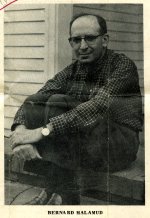
When Bern arrived at Corvallis, he had not published a book, nor anything of note otherwise. He immediately put himself on a schedule that was almost unalterable. On Monday, Wednesday, and Friday, he taught and had office hours. On Tuesday, Thursday, and Saturday, he reached his office at 9 a.m. and began to write. He sat on an upright wooden chair drawn up to a small table or desk. Sometimes to get his engine going, he would write a word or a sentence - if only at random - then the follow-up would be like toothpaste emerging from a tube under pressure. He has said that from a three-hours' work, he was lucky to get one page done.
Members of the staff on either side of him had to accustom themselves to hearing through the thin walls his voice notably raised as he tested out phrasing or dialogue to get them right. The neighbors knew that any interference would not be appreciated. From time to time they even listened and tried to make out whatever Bern could be up to. Also, he kept his door shut tight - probably locked - and his response to a perisistent knocker (raider in his opinion) was through a partially opened door. I think I remember that for a necessary communication, I once yelled through the door.
At noon, Ann usually delivered a light lunch, sometimes through the window. For early afternoon, he edited the script that Ann had typed. By midafternoon, he usually went home for a nap before dinner. Whenever he returned to visit us in Corvallis, I lent my study to him, as he became increasingly nervous from being away from his writing.

Credit: Bennington (VT) Banner, 1963.
"Book Review: The Unsung Heros of Bernard Malamud." Lisa Tate. Banner, Bennington, VA. November 2, 1963.
The evening was never for writing, but for reading, talking, or entertainment from parties, concerts, lectures, or movies. On one night a week, he taught on campus a course in creative writing. Bern felt that he could never really teach a person to write, but he could make a better reader of him.
He and I often exchanged babysitting. One evening when Louise and I returned from a movie, he said he had been plotting his projected novel and had decided upon the last line: "Gotcha pitcher!" When I recieved a copy of A New Life several years later, I quickly turned to the last page to discover that precise wording there.

